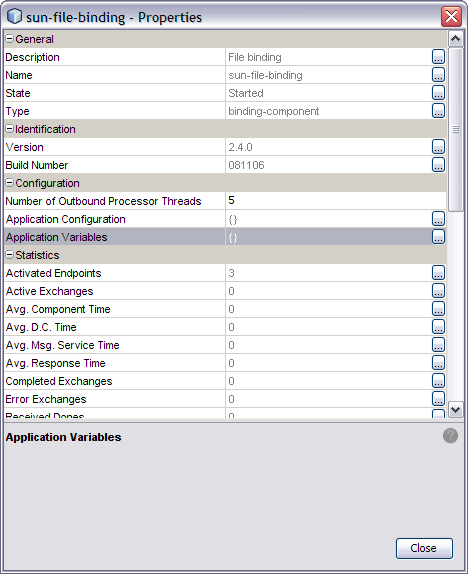| Skip Navigation Links | |
| Exit Print View | |

|
Oracle Java CAPS File Binding Component User's Guide Java CAPS Documentation |
| Skip Navigation Links | |
| Exit Print View | |

|
Oracle Java CAPS File Binding Component User's Guide Java CAPS Documentation |
Using the File Binding Component in a Project
About the File Binding Component
File Binding Component Features
Accessing the File Binding Component Runtime Properties
The File Binding Component Runtime Properties
Configuring File BC WSDL Attributes
Application Variables in File Name Patterns
File Binding Component Processing Protocol
Mapping Persisted Sequences to File Based Persistences
Application Configuration Support
Processing Protocols and Capabilities
Normalized Message Properties Defined by the File Binding Component
General Normalized Message Properties
Message Exchange Redelivery Capability
Endpoints Statistics and Monitoring Management
The binding component Application Variables property allows you to define a list of name:value pairs for a given stated type. The application variable name can be used as a token for a WSDL extensibility element attribute in a corresponding binding. For example, if you were defining an application variable for the hostname as FOO, then the WSDL attribute would be ${FOO}. In the Application Variables property you would enter a String value of FOO for the name, and the desired attribute as the value. When you deploy an application that uses application variables, any variable that is referenced in the application's WSDL is loaded automatically.
The Application Variables configuration property offers four variable types:
String: Specifies a string value, such as a path or directory.
Number: Specifies a number value.
Boolean: Specifies a Boolean value. The VALUE field provides a checkbox (checked = true).
Password: Specifies a password value. The password is masked and displays only asterisks.
Variables also allow greater flexibility for your WSDL files. For example, you can use the same WSDL for different runtime environments by using application variables to specify system specific information. These values can then be changed from the binding component runtime properties as needed, for any specific environment.
When you deploy an application that uses Application Variables, all of the Application Variables that are referenced in the application's WSDL files are loaded automatically. If you attempt to start an application and an Application Variables value is not defined (no value is specified for the Application Variable) an exception is thrown.
To change a property when the application is running, change your Application Variable property value, then right-click your application in the Services window under Servers > GlassFish V2> JBI > Service Assemblies, and click Stop in the popup menu. When you restart your project, your new settings will take effect.
